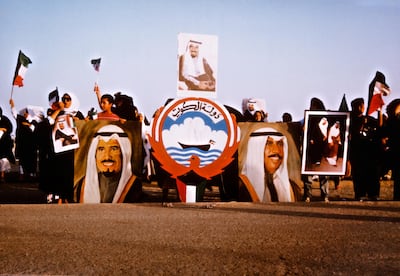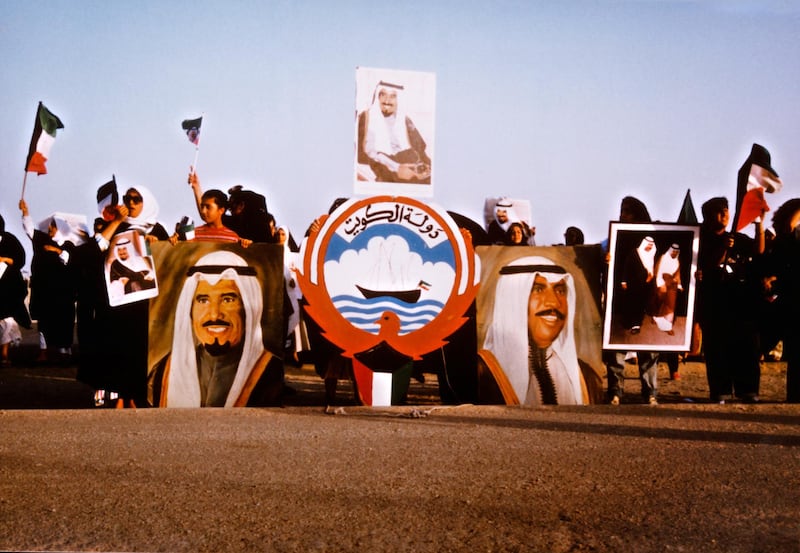When Iraqi forces invaded Kuwait on August 2, 1990, Dr Majda Al Saleh knew she would have to make a tough decision. Al Saleh had just given birth to her son Ali prematurely and she feared that he would not get the hospital care he needed in Kuwait. She cradled her newborn son Ali, said goodbye to her husband and family, knowing it could be the last time she saw them.
Al Saleh, then 28, left her husband, who was determined to resist the invasion, and first went to Saudi Arabia that October. From there, she made the gruelling journey by car into the UAE where she found a second home.
Although she was welcomed in a country that provided every possible comfort, the Kuwaiti felt a sense of hopelessness from the loss of a home that she might never return to. Her resistance to the war, inspired by those she left behind, would come from within.
“I pledged to fast until Kuwait was liberated, so I fasted every day and I was ready to fast for the rest of my life,” she says.
On August 2, 1990, Saddam Hussein sent his troops into Kuwait and seized the country within a day. The move prompted international outrage but it would take months for the country to be liberated by an international coalition.
During her time here, Al Saleh, who is the head of the medical department at Mubarak Al Kabeer Hospital in Kuwait, took care of her son and worked at a public hospital in Dubai. Al Saleh was determined to make sure she could provide for her own despite the UAE government’s insistence on paying every Kuwaiti a monthly stipend.
__________________________
READ MORE:
How the Iraqi invasion of Kuwait shook the world
Kuwait marks anniversary of Iraq invasion – but row breaks out over what to call it
Book review: Hala Alyan’s Salt Houses is an epic tale of one Palestinian family’s displacement
__________________________
"All the doctors, all my colleagues at the hospital, they would plead with me to take a tea break but I wouldn't."
Instead, she spent her breaks at the hospital glued to the television or devouring newspapers for whatever news she could get about Kuwait, a country now fully occupied by Iraqi forces and with her brother-in-law now taken captive by the Iraqis.
“I consider the invasion to be the darkest period of my life, the worst part of my memories. But the only light, the only flicker of hope, was the time I spent in the UAE,” she says.
During the occupation, some stayed in Kuwait, others immediately fled, while another group found themselves stranded abroad. Fatemah Al Aqrouqah was one of these people. Al Aqrouqah, then a Kuwaiti graduate student in her late 30s, left the country for the University of Alberta in Edmonton, Canada, for a summer course just weeks before the war. She felt that hostilities between Kuwait and Iraq were heating up over a border dispute but that it was nothing out of the ordinary.
“It wasn’t the first time and it was always the same: they’d bicker in the morning and drink tea in the afternoon,” Al Aqrouqah tells me.
So as Al Aqrouqah left a cinema after class on August 2, and returned home to the phone ringing, she was not expecting a call telling her that the “bickering” had transformed into a full-blown war.
“In a moment, they told us we didn’t have a country anymore,” Al Aqrouqah says. “So we wanted to go back to Kuwait immediately.”
The Kuwaiti embassy they called in Washington DC told them they could not return. They said all their accounts had been frozen and a return home was not possible as long as the country remained in turmoil.
Instead, they were asked to go to the UAE, and to stay there until further instructions from the Kuwaiti embassy in Abu Dhabi.
Twenty-seven years on, Al Aqrouqah recalls going from being a carefree student to someone without a home.
“I’ll carry this in my heart forever,” she says. “From the moment we arrived in the airport, the Emiratis were waiting for us, they provided us with every inch of support, we didn’t feel like guests, we felt like family,” the Kuwaiti says.
From both the government and individuals, the UAE offered Kuwaitis support in the form of shelter, medical care and stipends.
“It was heartwrenching, of course, when you heard the news every day; no matter how hospitable and how lovely the Emirati people were, there was an indescribable pain I felt.”
However, she said the culmination of Emirati hospitality took place as she took part in a Kuwaiti fundraiser in the capital. Al Aqrouqah says Sheikha Fatima, Mother of the Nation, who inaugurated the event, “shed a tear that I’ll never forget”.
During the fundaiser, one of the Kuwaitis announced that President Sheikh Zayed had donated Dh10 million for one of the plates of sweets being sold, to provide relief for families.
“To which Sheikha Fatima instantly replied, saying that wasn’t a donation, you can’t donate anything to Kuwait. That was a symbol of solidarity,” says Al Aqrouqah.
The proceeds went to help about 70,000 Kuwaitis who had fled to the country. “This wasn’t a singular event. This was the way that Kuwait and the UAE were, always standing alongside each other.”
Kuwait and the UAE have always had a close working relationship, with Kuwait playing a key role in the rapid modernisation of the UAE in the 1970s and 1980s and having offered scholarships to Emiratis since 1955.
However, the commitment and display of kinship between the two countries was shown in full light when Sheikh Zayed issued an order to provide all Kuwaitis who sought asylum in UAE lands both shelter and a stipend, for however long the conflict lasted.

In fact, the UAE was one of the first to respond to the distress call by an invaded Kuwait and sacrificed at least six martyrs in the battle to liberate Kuwait six months later.
According to a news report from Al Ittihad, Sheikh Zayed was at a meeting in Cairo with Egypt's ruler, Hosni Mubarak, when he heard the news that Iraq had invaded Kuwait. Within hours, he boarded a plane to Saudi Arabia to come up with an action plan. But the hospitality came not only in the form of a government decree; it was the Emiratis themselves.
Famously, Emirati businessman Jumaa Al Mazroui made all his apartments available to Kuwaiti families, free of charge.
Although many came out of circumstances, some Kuwaitis fled the war through decisions that still weigh heavily on them to this day.
“There’s guilt, of course there’s guilt,” says former asylum-seeker, Mohammed, 50, who does not want to give his full name. “But how do you make a decision to stay when you have kids?”
He left with his two sons, daughter, and wife across the Saudi border, where they remained for a month before going to the UAE and remaining there for the duration of the war.
“When you heard the stories from back home, you remember that it was the right decision, but it was difficult to look back on. I am constantly wondering what would have happened if Kuwait was never liberated,” he says.
That was how many Kuwaitis spent a period of tense uncertainty in what soon became their second home. On February 26, 1991, the news of Kuwait’s liberation arrived, to both Kuwaitis in Kuwait and scattered around the world.
“Only then, only then, finally, did I take my break with a cup of tea,” says Al Saleh. “Unbelievable, the pinnacle of happiness when we found out. All these months, fasting, praying, we just started jumping and screaming. Both Kuwaitis and Emiratis, all of us, we started screaming.”





